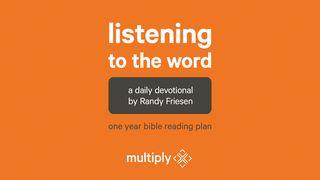Plan info
For The Love Of GodSample

SOMEONE HAS SAID THAT THE entire book of Hosea can be understood as a study of what it means to turn back to God. Here there are no glib nostrums; merely verbal apologies are not acceptable. And yet hope is held out for people who display the kind of return that the Lord does accept. Nowhere is that tension clearer than in Hosea 5-6.
Hosea 5 opens with an indictment of Israel, especially the leaders. Nothing about them is unknown to God (Hos. 5:3; cf. 7:2; Heb. 4:13). Their problem is not merely an intellectual one, but is profoundly moral: “Their deeds do not permit them to return to their God. A spirit of prostitution is in their heart; they do not acknowledge the LORD” (Hos. 5:4; cf. John 3:19). Worse, when they do formally “seek” the Lord, their pursuit is so false that he withdraws from them, for God is not the prisoner of his own sacrificial system (Hos. 5:5-6). In bringing judgment upon them, God’s purpose is not only retribution but inducement to repentance: “Then I will go back to my place until they admit their guilt. And they will seek my face; in their misery they will earnestly seek me” (Hos. 5:15).
The opening verses of chapter 6 (vv. 1-3) can be understood in two ways. (1) They may be a moving plea from Hosea to his own people to repent and turn to the Lord. He wants them to move away from religion as sacrificial observance to religion as genuine acknowledgment of the Lord. The same God who has chastened the people will then gladly bind up their wounds. “As surely as the sun rises, he will appear” (Hos. 6:3). (2) They may be the words of the people themselves—and in that case the context in which they are embedded suggests that, although they sound very good, in reality they mean little (cf. Ps. 78:34, 36-37). Such repentance is mere presumption, and God sees through it and dismisses it, for their “love is like the morning mist, like the early dew that disappears” (Hos. 6:4)—like Gomer’s love. Either of these two ways of taking 6:1-3 makes sense; in both instances the fickleness in God’s covenant people is deeply repugnant. If I have to choose between the two, I tilt toward the first. Hosea 6:1-3 sounds rather more like genuine repentance that is urged but not followed, than like the empty words of insincere hypocrites.
Whatever the interpretation, clearly God is not impressed with mere words and religious observance: “For I desire mercy, not sacrifice, and acknowledgment of God rather than burnt offerings” (Hos. 6:6; cf. Matt. 9:13; 12:7). A generation that lustily sings God’s praises while lustily sleeping around had better expect the blistering judgment of God.
About this Plan

A daily devotional for discovering the riches of God's word: For the Love of God is a daily devotional designed to walk a person through the Bible in a year while assisting the reader in discovering the riches of God's W...
More
We would like to thank The Gospel Coalition for providing this plan. For more information, please visit: thegospelcoalition.org









